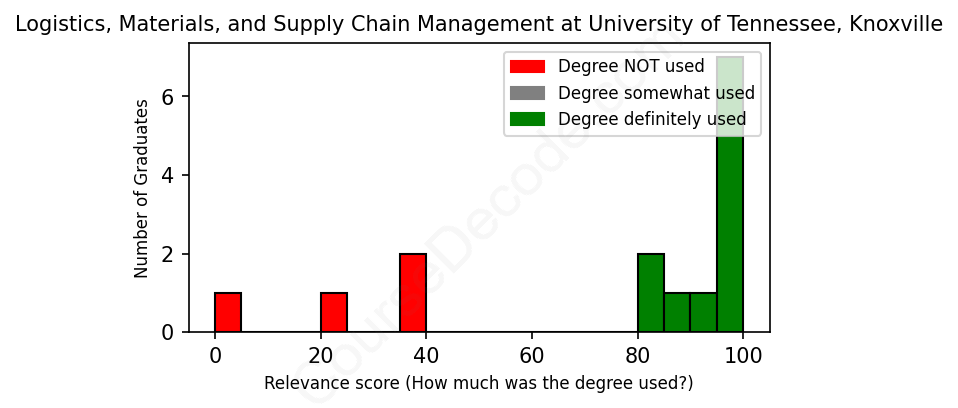
First, some facts. Of the Logistics, Materials, and Supply Chain Management graduates from University of Tennessee, Knoxville we've analyzed , here's how many have used (or NOT used) their degree in their career:

These are estimates based on AI analysis of 15 LinkedIn profiles (see below).
The verdict? Above average. Overall, with an average relevance score of 75%, Logistics, Materials, and Supply Chain Management graduates from University of Tennessee, Knoxville have a higher likelihood (+8%) of finding work in this field compared to the average graduate across all fields:
And for comparison, here's the chart for all profiles we've looked at across all degrees.
Also, after graduating, only 13% of these graduates have pursued further education other than another Bachelor's degree (such as a Masters degree or other), compared to the average across all profiles of 35%. This suggests a Bachelors degree is enough for most Logistics, Materials, and Supply Chain Management graduates, and it's normal to look for work straight after graduation.
See the details:
|
Relevance score: 100% We think this person has gone into a career highly relevant to their degree. We think this person has gone into a career highly relevant to their degree.
DEGREE INFOGraduated in 2021 from University of Tennessee, Knoxville with a Bachelor's in Logistics, Materials, and Supply Chain Management. No other secondary education since. JOB HISTORY SINCE GRADUATIONDemand Chain Management Analyst Dollar General Jun 2021 - Present Senior Demand Chain Management Analyst  Dollar General Oct 2022 - Present ABOUTNo information provided. |
The top 10 most common jobs done by the graduates we've analyzed (ranked most common to least) are:
When looking at the job paths of graduates from the University of Tennessee, Knoxville who studied Logistics, Materials, and Supply Chain Management, a clear trend emerges. Many of them have landed positions that are directly relevant to their degrees, especially roles like Order Management Agent, Logistics Business Analyst, and various positions at Amazon. These jobs involve critical logistics and supply chain skills, showcasing a strong application of what they learned in their studies. For instance, positions such as Area Manager and Supply Chain Analyst at Amazon and Dollar General require hands-on knowledge of supply chain processes, making them excellent fits for their education.
However, not all job choices align as neatly with their field of study. Some graduates, like those who took on roles as Bank Tellers or Sales Representatives, found themselves in positions that do not utilize logistics or supply chain skills at all. This suggests that while many graduates successfully transition into relevant roles, others venture off the path into unrelated industries. Overall, there's a solid number of graduates working in fields that directly reflect their academic training, but there's also a noticeable percentage who either explore different opportunities or don’t fully leverage their specialized knowledge in logistics and supply chain management.
Here is a visual representation of the most common words in job titles for Logistics, Materials, and Supply Chain Management graduates (this is across all Logistics, Materials, and Supply Chain Management graduates we've analyzed, not just those who went to University of Tennessee, Knoxville):

Looking at the career trajectories of graduates from the University of Tennessee, Knoxville with degrees in Logistics, Materials, and Supply Chain Management, it's clear that many of them kick-start their careers with positions that are squarely in their field. For example, recent graduates often land roles like Warehouse Operations Manager or Logistics Analyst, where they get hands-on experience in the industry. By five years out, many of these graduates have moved up the ladder into more senior roles such as Area Manager at Amazon or Senior Demand Chain Management Analyst at Dollar General. It seems like a lot of them are able to leverage their early roles into significant career advancements, and many of them are still within the logistics and supply chain sector—this bodes well for their careers.
However, not every graduate has followed this trend. Some have taken detours into unrelated fields—like going from a Bank Teller to a Sales Representative—before finding their way back into logistics later. Interestingly, a few have shifted gears entirely, with people ending up in roles that aren't in logistics at all, like litigation paralegal. But overall, if you’re looking at the majority of these LinkedIn profiles, it looks like a good number of these grads are finding solid pathways in their chosen field. So, if you're thinking about this major, you can feel pretty confident that it can lead to promising career opportunities!
Honestly, getting a Bachelor’s degree in Logistics, Materials, and Supply Chain Management can be a bit of a mixed bag at the University of Tennessee, Knoxville, just like anywhere else. Some students find it pretty manageable because the courses often blend math and business concepts, which might click with you if you like numbers and organization. Others might struggle with things like statistical analysis or the complexities of supply chain operations, especially if you're not a fan of math-heavy subjects. Overall, it's considered to be on the easier side compared to some more technical degrees, but it definitely has its challenges, especially if you want to really understand the logistics behind it all. Just be ready to put in some effort, and you should do just fine!
Most commonly, in the LinkedIn profiles we've looked at, it takes people 4 years to finish a Bachelor degree in Logistics, Materials, and Supply Chain Management.
Looking at these graduates from the University of Tennessee, Knoxville, it seems like many of them have found decent job opportunities in logistics and supply chain management, especially those who graduated more recently. The first graduate made a solid progression from an Order Management Agent to a Logistics Business Analyst, which typically offers better pay. Most of the 2020 and 2021 grads have landed roles in larger companies like Amazon and Dollar General, which generally offer competitive salaries and career growth potential. However, some early-career positions, like bank tellers and service roles, might not pay as well. So, while it varies, a lot of them seem to be on track for making a good living in their fields.
Here is a visual representation of the most common words seen in the "about" section of LinkedIn profiles who have a Bachelor degree in Logistics, Materials, and Supply Chain Management (this is across all Logistics, Materials, and Supply Chain Management graduates we've analyzed, not just those who went to University of Tennessee, Knoxville). This may or may not be useful:

Here are all colleges offering a Bachelor degree in Logistics, Materials, and Supply Chain Management (ordered by the average relevance score of their Logistics, Materials, and Supply Chain Management graduates, best to worst) where we have analyzed at least 10 of their graduates:
| College | Score | Count |
|---|---|---|
 Michigan State University Michigan State University
|
84 | 23 |
 Auburn University Auburn University
|
83 | 19 |
 Ashford University Ashford University
|
82 | 12 |
 University of Wisconsin-Milwaukee University of Wisconsin-Milwaukee
|
81 | 10 |
 Rutgers Business School Rutgers Business School
|
79 | 24 |
 Penn State University Penn State University
|
78 | 21 |
 Embry-Riddle Aeronautical University Embry-Riddle Aeronautical University
|
78 | 10 |
 Arizona State University - W. P. Carey School of Business Arizona State University - W. P. Carey School of Business
|
78 | 14 |
 Iowa State University Iowa State University
|
77 | 14 |
 University of Houston University of Houston
|
76 | 30 |
 University of Arkansas University of Arkansas
|
76 | 18 |
 University of Tennessee, Knoxville University of Tennessee, Knoxville
|
75 | 15 |
 University of North Texas University of North Texas
|
69 | 14 |
 Texas A&M University Texas A&M University
|
67 | 27 |
 Georgia Southern University Georgia Southern University
|
62 | 13 |
 The Ohio State University The Ohio State University
|
60 | 10 |
 University of Houston-Downtown University of Houston-Downtown
|
57 | 13 |